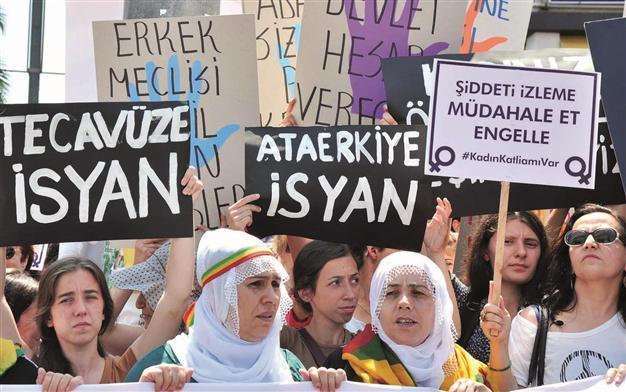Concerns for women’s social space in Turkey on rise, as key treaty enters into force
ANKARA

Turkey ranked 120th of 136 nations in the World Economic Forum’s 2013 Gender Gap Index, down 15 places since 2006. DHA Photo
At a time when concerns are growing in Turkey due to an increasingly conservative and authoritarian political culture, which directly impacts the lives of women, the Istanbul Convention, a landmark treaty of the Council of Europe (CoE) dedicated to preventing and combating violence on women and domestic violence, is entering into force as of August 1.Although Turkey was the convention’s first signatory in May 2011, soon after it was opened to signatures by member states, violence targeting women is widespread in the country, despite attempts to beef up legislation and training programs for officials.
Main opposition Republican People’s Party (CHP) Ankara deputy Gülsün Bilgehan has warned that the treaty should not remain solely on paper for Turkey and called on the government for the urgent implementation of an action plan.
“Violence targeting women is a problem in developed countries, too. However, the picture we face in Turkey is very dire. We should accept Aug. 1 as a milestone and should take the necessary steps to protect our women with international armor,” said Bilgehan on July 31, as she noted that, in Turkey, 129 women were killed in the first six months of 2014.
The CHP deputy, currently a member of the Parliamentary Assembly of the Council of Europe (PACE), played a leading role in drafting the Istanbul Convention when she chaired PACE’s Committee on Equal Opportunities for Women and Men from 2002 to 2007.
“Turkey is a full-member of the Council of Europe. It should also display full determination in implementing the convention. An action plan should urgently be implemented to bring the Convention’s vision into action,” Bilgehan said.
According to the CoE, it is estimated that at least 12 women are killed by gender-related violence in Europe every day. In 2013, available statistics showed domestic violence claimed the lives of 121 women in France, 134 in Italy, 37 in Portugal, 54 in Spain and 143 in the United Kingdom.
“In Azerbaijan, 83 women were killed and 98 committed suicide following cases of domestic violence, while data collected by the media in Turkey reported that at least 214 women were killed by men last year, mainly in cases of domestic violence and often despite these women having asked the authorities for protection. Available data covering the first six months of 2014 in many European countries continue to show such alarming figures,” the CoE said.
“The entry into force of the Istanbul Convention is to be welcomed also because it will contribute to ending forced marriage, female genital mutilation and forced abortion and sterilization. Europe is not immune to these forms of violence: in its 2012 Resolution, the European Parliament estimates that around 500,000 women and girls live with female genital mutilation in the European Union, while 180,000 others are at risk of being subjected to the practice every year,” it also said.
‘Rules of morality’
Turkey, which aspires to join the European Union, has drafted new legislation to try to bring women’s rights in line with European standards. A law sent to Parliament in June will toughen sentencing for sexual assault.
Officials say the number of shelters has doubled in the past three years and victim support centers have been set up, allowing women to receive protection and remain with their children.
But activists and lawyers say there are still not enough and that the increasingly conservative and authoritarian political culture under Prime Minister Recep Tayyip Erdoğan’s government, means progress is, at best, halting.
Turkey ranked 120th of 136 nations in the World Economic Forum’s 2013 Gender Gap Index, down 15 places since 2006, while a 2011 U.N. report indicated domestic violence rates were almost twice those in the United States and 10 times higher than in some European countries.
Activists widely point at Erdoğan’s strident views on everything from abortion, to the number of children women should have, the sort of meddling in private life that may bolster his standing among his pious core supporters, but which alienates the more Western-leaning, secularist strain of Turkish society.
In a 2010 speech, he said he “did not believe in the equality of men and women.” Two years later, he likened abortions to the killing of civilians in a military airstrike; activists say abortions all but stopped, since many health workers became too frightened to carry them out.
As recently as earlier this week, Arınç, a senior member of Erdoğan’s Cabinet, caused outcry by suggesting women should not laugh loudly in public and waded into new controversy by attacking women who he said could not resist pole dancing.
Arınç, a co-founder of the ruling Justice and Development Party (AKP), in recent days has strongly criticized what he sees as a decline of moral standards in Turkey.
His comment earlier this week that women should not laugh in public was ridiculed by secular Turks, with women taking to Twitter en masse to post pictures of themselves laughing hysterically.
Arınç said in televised comments on July 30 that his remarks had been taken out of context and he had wanted to comment on the “general rules of morality.”
But he added: “There are women who leave on holiday without their husbands and others who don’t have self-control and can’t stop themselves from climbing up a pole.”
“Anyone can live like this. I can’t be angry at you, I just have pity for you,” he said.
















